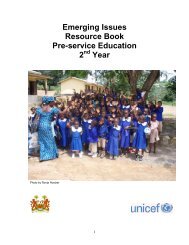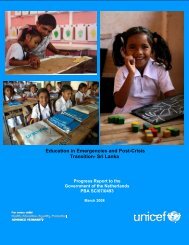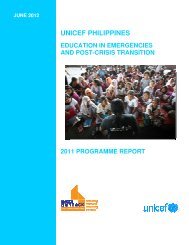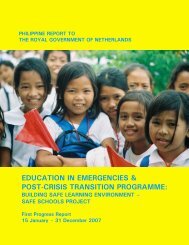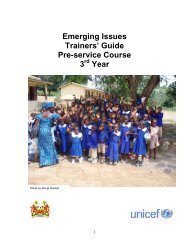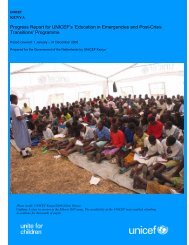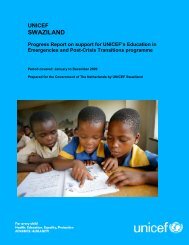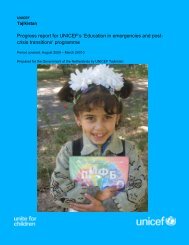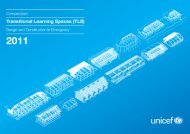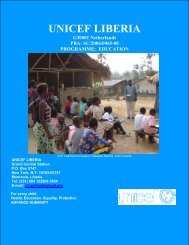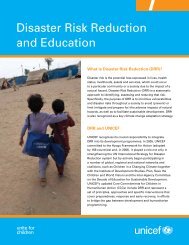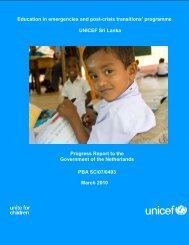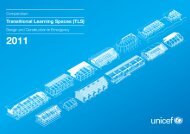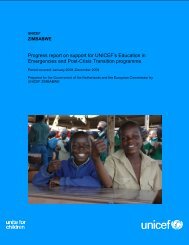Disaster Risk Reduction in School Curricula: Case Studies ... - Unicef
Disaster Risk Reduction in School Curricula: Case Studies ... - Unicef
Disaster Risk Reduction in School Curricula: Case Studies ... - Unicef
You also want an ePaper? Increase the reach of your titles
YUMPU automatically turns print PDFs into web optimized ePapers that Google loves.
45<br />
Section 8.<br />
<strong>Disaster</strong> <strong>Risk</strong> <strong>Reduction</strong> Education:<br />
Learn<strong>in</strong>g Outcomes<br />
The global picture of disaster risk<br />
reduction curriculum provision reveals a<br />
failure to engage comprehensively with<br />
the question of learn<strong>in</strong>g outcomes.<br />
Learn<strong>in</strong>g outcomes are heavily weighted<br />
towards knowledge with little attention<br />
given to skills and attitudes.<br />
A comprehensive enumeration of learn<strong>in</strong>g<br />
outcomes is a prerequisite of quality DRR<br />
education.<br />
In their review of the documentation and development of the<br />
case studies, the researchers encountered no comprehensive<br />
list of DRR-related learn<strong>in</strong>g outcomes. Lists of outcomes<br />
connected to specific subject-based courses are <strong>in</strong> evidence<br />
<strong>in</strong> a few cases, usually couched <strong>in</strong> the lexicon of the carrier<br />
subject and <strong>in</strong>formed by the prevail<strong>in</strong>g learn<strong>in</strong>g outcome expectations<br />
of that subject. Brief lists of broadly formulated learn<strong>in</strong>g<br />
outcomes can also be found. What comes across <strong>in</strong> the case<br />
studies is a hazy global picture <strong>in</strong> which no <strong>in</strong>ternationally<br />
agreed upon taxonomy of disaster risk reduction learn<strong>in</strong>g<br />
outcomes is discernable.<br />
An analysis of the learn<strong>in</strong>g outcomes featured <strong>in</strong> the Learn<strong>in</strong>g<br />
Outcomes and Competencies sections of the thirty case<br />
studies reveals a heavy predom<strong>in</strong>ance of knowledge-based<br />
outcomes. The level of ambition mostly stops at knowledge.<br />
Skills-based learn<strong>in</strong>g outcomes feature <strong>in</strong> the literature and<br />
case studies but are often restricted to practical skills that fall<br />
short of prepar<strong>in</strong>g students to realize the ambitions laid out for<br />
DRR <strong>in</strong> education, such as engagement <strong>in</strong> community action.<br />
Throughout the study it becomes clear that treatment of learn<strong>in</strong>g<br />
outcomes address<strong>in</strong>g attitudes or dispositions is tokenistic.<br />
There may be a pass<strong>in</strong>g nod to, say, ‘respect’ but little else.<br />
Across the field, there is confusion concern<strong>in</strong>g what are<br />
knowledge, skills and attitud<strong>in</strong>al outcomes.<br />
The researchers had previously decided to prepare lists of<br />
generic and hazard-specific learn<strong>in</strong>g outcomes. The latter<br />
quickly appeared suspect not least because multi-hazards are<br />
present <strong>in</strong> many different contexts; thus, after due consideration,<br />
only a generic list was produced, a list that can easily be converted<br />
to the hazard-specific if required. It is the researchers’<br />
view that there are knowledge/understand<strong>in</strong>g, skills and<br />
attitud<strong>in</strong>al/dispositional learn<strong>in</strong>g outcomes that are generic<br />
to the entire DRR <strong>in</strong> the education field. These, as they see<br />
them, are set out below.<br />
The knowledge and understand<strong>in</strong>g section of the list more<br />
or less follows a classic concentric circles model with local and<br />
community knowledge and understand<strong>in</strong>g outcomes extend<strong>in</strong>g<br />
to national, regional and global outcomes. While l<strong>in</strong>ear, the list<br />
should be read systemically, with the local conceived of as part<br />
of the global and the global manifest <strong>in</strong> the local. Similarly,<br />
skills outcomes are organized on a cont<strong>in</strong>uum rang<strong>in</strong>g from<br />
cognitive to affective to action with a f<strong>in</strong>al systemic skills section<br />
partially <strong>in</strong>tended to signal that the development of all skills are<br />
<strong>in</strong>extricably l<strong>in</strong>ked. The attitud<strong>in</strong>al and dispositional learn<strong>in</strong>g<br />
outcome section reta<strong>in</strong>s an arbitrary element <strong>in</strong> its organization<br />
<strong>in</strong> that attitudes and dispositions, even more than skills, blend<br />
<strong>in</strong>to each other and are not, <strong>in</strong> the f<strong>in</strong>al analysis, divisible.<br />
The learn<strong>in</strong>g outcomes <strong>in</strong>clude both the disaster specific and<br />
the more general consequences. For example, there is a<br />
knowledge and understand<strong>in</strong>g outcome that ‘learners know<br />
of disaster-vulnerable local spots and populations’ while there<br />
is another call for learners to understand ecosystems and<br />
understand that ‘the reverberations of environmentally<br />
unfriendly behaviours will work through the system to harm<br />
humans’. This mix is predicated on the idea that there are<br />
immediate and also more profound or sub-structural dimensions<br />
to disaster risk mitigation. In this example, be<strong>in</strong>g familiar with<br />
disaster-vulnerable locations and populations is of vital and<br />
immediate importance to students and their communities while<br />
foster<strong>in</strong>g understand<strong>in</strong>g of the human impact upon ecosystems<br />
<strong>Disaster</strong> <strong>Risk</strong> <strong>Reduction</strong> <strong>in</strong> <strong>School</strong> <strong>Curricula</strong>: <strong>Case</strong> <strong>Studies</strong> from Thirty Countries



